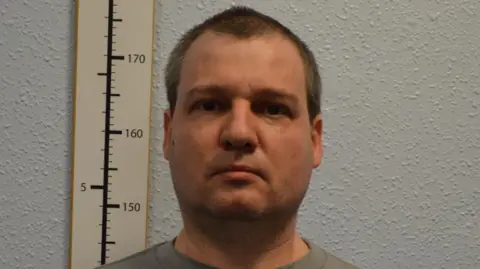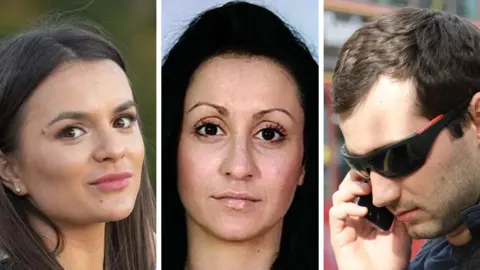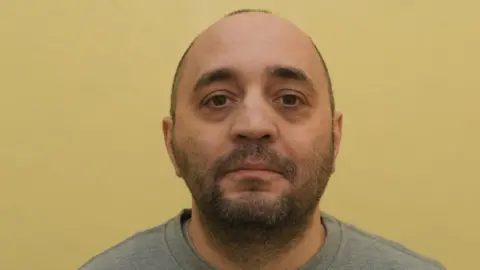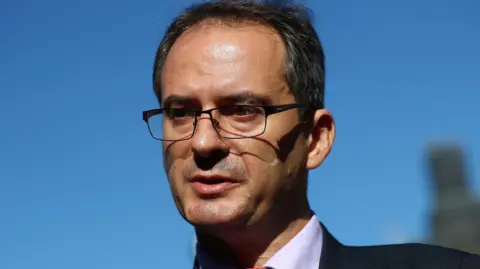 Metropolitan Police
Metropolitan PoliceA man who has admitted spying for Russia in the UK discussed potentially killing a journalist who uncovered Russian links to the 2018 Salisbury attack, a court has heard.
Orlin Roussev allegedly exchanged messages in 2021 about targeting Christo Grozev, a Bulgarian national and an investigative journalist for the ‘Bellingcat’ group.
Roussev, 46, from Great Yarmouth, as well as Biser Dzhambazov, 43, from London, have admitted conspiracy to spy. Their guilty pleas were able to be reported for the first time on Thursday.
Jurors at the Old Bailey were told about the convictions at the start of a trial involving three other alleged spies.
Katrin Ivanova, 33, Vanya Gaberova, 30, and Tihomir Ivanchev, 39, all from London, deny a charge of conspiracy to spy.
Ms Ivanova also denies possessing multiple false identify documents.
Prosecutor Alison Morgan KC told the court Roussev and Dzhambazov had already admitted being part of the same espionage activity.
The three defendants on trial are accused of having spied for the benefit of Russia, “an enemy of the UK”, between 2020 and 2023, Ms Morgan said.
She added that they sought to gather information including about various targets, both people and locations, of particular interest to the Russian state.
Jurors were told that messages between the defendants showed them acting as a “team”, working under the direction of Roussev, and that he, in turn, received instructions from Jan Marsalek, who was working as an “intermediary for the Russian intelligence services”.
The court heard Marsalek is an Austrian national and can “properly be described as a Russian agent”.
 Supplied
SuppliedThe court heard that a Great Yarmouth guesthouse occupied by Roussev was “packed” with technical equipment used for spying.
During the period of the alleged conspiracy, the group had available 221 mobile phones, 258 hard drives, 495 SIM cards, 33 audio recording devices, 55 visual recording devices, 11 drones, 16 radios, and three IMSI grabbers – which are highly technical pieces of equipment that allow for data about devices being used nearby to be captured and exploited.
They also had Wi-Fi eavesdropping devices and jammers, and 75 passports and identity documents, including 55 in other individuals’ names, the court heard.
Ms Morgan said the defendants were “sophisticated in their methodology; carrying out surveillance activity of individuals and places; manufacturing and using false identities and deploying advanced technology to acquire information”.
She said the defendants had “obtained imagery” and “compiled detailed reports on their targets”.
“They were paid significant sums of money for their actions. And they all knew why they were being tasked to conduct their operations. Their activity was being undertaken for the direct or indirect benefit of Russia,” she said.
 Metropolitan Police
Metropolitan PoliceMs Morgan said the prosecution will concentrate on six “key operations” carried out by the defendants, with each of them playing a role in at least two of the operations. The operations related to targeted people or places.
She said it was not disputed that the defendants were carrying out surveillance activities, but jurors will have to determine in relation to each defendant why they were carrying out surveillance.
The evidence showed “high level espionage with high levels of deceit”, Ms Morgan said, and all three defendants stood or sat near to “real life targets, real people”, filming them and capturing information using sophisticated equipment.
The prosecutor added that direct contact with targets was envisaged, for example, by the female defendants being used as a “honey trap, as sexual bait to capture more information from the targets”.
The six ‘key operations’
 Reuters
ReutersOperation 1
Jurors heard that this was targeting Mr Grozev. Among other things, he uncovered Russian links to the 2018 Salisbury attack.
The court heard that, in 2021, Jan Marsalek and Roussev exchanged messages discussing their options in relation to Mr Grozev, including the placing of team members in seats next to him on planes.
They also discussed potentially robbing him of his laptop and phone and taking it to the Russian Embassy, burning his property, kidnapping him and taking him to Moscow, or killing him.
Operation 2
Allegedly targeting Roman Dobrokhotov in November 2022. He is a Russian investigative journalist and founder of the media outlet ‘The Insider’.
He had to flee Russia having been arrested and then deprived of his passport.
Operation 3
This targeted a man called Bergey Ryskaliyev in November 2021, the court heard.
Mr Ryskaliyev is a Kazakhstan national and former politician. He fled to the United Kingdom where he was later granted asylum.
There is and was a clear motive for Russia to develop relations with Kazakhstan, the court heard.
Prosecutors said that targeting a political dissident on behalf of Kazakhstan cultivates those relations by providing Kazakhstan with what it might consider to be assistance.
Operation 4
Allegedly planning disruptive activity at the Kazakh embassy in London in September 2022.
The court heard that the plan was to stage a demonstration outside the embassy – a “fake protest” – to create a pretence that they were in possession of genuine intelligence about those responsible, which they would then pass on to the Kazakhstan intelligence to try to gain favour with Kazakhstan on behalf of Russia.
Operation 5
Alleged surveillance at the Patch Barracks, a US Military Base in Stuttgart in late 2022.
This is a US military airbase, which jurors heard was believed by the defendants to be a location where Ukrainian forces were being trained in the use of surface to air weapons, at the very time of Russia’s invasion into Ukraine.
Prosecutors say the defendants’ plan was to target the airbase using a range of highly sophisticated technology designed to capture key intelligence about those present on the base.
Operation 6
Jurors were told this plan was targeting a man called Kirill Kachur.
He a Russian national who spent time in Montenegro who was employed by the Investigative Committee of Russia but left the country in 2021 and was designated as a “foreign agent” by Russia in November 2023.

